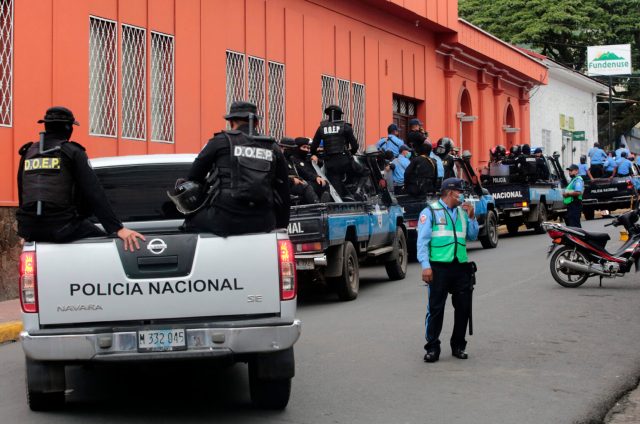
According to the Rule of Law Index 2022 from international organization World Justice Project (WJP), published in October, the rule of law has declined globally for the fifth year in a row. Venezuela and Nicaragua are the countries that showed the most deterioration.
By Dialogo Américas – Julieta Pelcastre
Dec 14, 2022
“We are facing the dismantling of polyarchic institutions […] in Venezuela and Nicaragua,” Daniel Varnagy, a political science scholar at Venezuela’s Simón Bolívar University, told Diálogo on November 21. “We can only speak of remnants of separation of powers, of remnants of democratic institutionality.”
Washington, D.C.-based WJP collected and analyzed data from 140 countries and jurisdictions to determine how the rule of law is experienced and perceived. Since 2009, the index has been used by governments, multilateral organizations, the private sector, and nongovernmental organizations (NGOs) worldwide to assess and address gaps in enforcing the law.
“Authoritarian trends […] continue to erode the rule of law,” Elizabeth Andersen, WPJ executive director, said during the presentation of the index. “Checks on executive power are weakening and respect for human rights is falling.”
WJP defines the rule of law as an enduring system of laws, institutions, norms, and community engagement, ensuring accountability, fair laws, open government, and access to justice.
According to the index, the factors driving the weakening of the rule of law in Venezuela and Nicaragua are fewer limits on government powers, lack of protection of fundamental rights, deterioration in the civil and criminal justice systems, increased corruption, and lack of security.
In addition, freedom of opinion and expression and freedom of assembly and association have continued to decline in 2022. This makes it more difficult for citizens to curb or reverse authoritarian tendencies in their countries, the study indicates.
“The close link between democracy and the rule of law in both Venezuela and Nicaragua has severely been eroded,” Varnagy said. “When there is a disease in one there is a disease in the other.”
Venezuela
According to this year’s index, Venezuela’s overall rule of law score declined 1.4 percent, placing the country at the bottom rank worldwide (140th out of 140 countries).
Among the factors taken into account for the index, on corruption Venezuela ranked 130th out of 140 countries worldwide, and 29th out of 32 countries in Latin América and the Caribbean. The report points out that Venezuela’s criminal justice performance ranked last both globally and regionally.
In Caracas, criminal justice does not fulfill its function, and even does the opposite of what the Constitution and human rights treaties require, Venezuelan NGO Acceso a la Justicia indicates on its platform. It is inefficient, unresponsive, extremely delayed, and not autonomous, it adds.
The police, the Attorney General’s Office, the Public Defense, and the Judiciary, as part of the justice administration, instead of providing security to Venezuelans, persecute them in order to repress their legitimate claims, the NGO says. These institutions are accomplices of the regime’s repression.
“In the case of Venezuela, the civilian population is extremely disappointed, disillusioned,” Varnagy said. “It is increasingly apathetic in political terms, and therefore there is no search for [accountability] for the independence of powers.”
Nicaragua
The rule of law in Nicaragua fell 4.6 percent, compared to 2021. It ranks 133rd out of 140 countries. Among the most important trends observed in Nicaragua is the deterioration of the factor measuring Open Government, the index indicates.
Managua ranks 30th out of 32 countries studied in Latin América and the Caribbean, according to the report. However, in order to obtain data from Nicaragua, WJP encountered a series of obstacles, because of the “increased roadblocks to freedoms,” independent Nicaraguan media outlet Divergentes reported.
Authoritarian tendencies in Managua are also worsening, according to Divergentes. For example: in less than two weeks the Daniel Ortega regime expelled the European Union ambassador from the country, broke off relations with the Netherlands, and vetoed the entry of the new U.S. ambassador, German news agency DW reported on October 4.
“In Nicaragua there is a rise not only in distrust of authorities, but also fear,” Varnagy said. “With this lack of trust there is unfortunately a massive de-institutionalization of what was left of democratic institutions.”
Globally, according to the index, the country with the best score is Denmark, followed by Norway, Finland, Sweden, and the Netherlands. The best performer in Latin América is Uruguay, ranked 25th worldwide, followed by Costa Rica and Chile.
“If the weakening of the rule of law in Venezuela and Nicaragua, which are classified as authoritarian regimes, continues to deepen, it may migrate toward even more authoritarian schemes,” concluded Varnagy. “The hope is that societies do something before allowing themselves to be asphyxiated.”
…
Read More: Dialogo Américas – Rule of Law Virtually Nonexistent in Venezuela and Nicaragua
…

